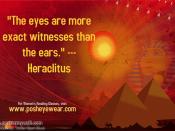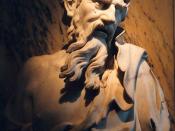Introduction
1. Fl. 500 B.C. in Ephesus, north of Miletus in Asia Minor. He was known in antiquity as "the obscure." And even today, it is very difficult to be certain what Heraclitus was talking about. As Barnes says (Presocratics, p. 57):
"Heraclitus attracts exegetes as an empty jampot wasps; and each new wasp discerns traces of his own favourite flavour."
The reason for this is Heraclitus's dark and aphoristic style. He loved to appear to contradict himself. Some of his doctrines sound incoherent and self-contradictory even if he did not perhaps intend them that way.
2. One thing seems certain: Heraclitus had an extremely negative reaction to Milesian thought. For the Milesians, what is real is fixed and permanent; change somehow had to be explained away. They understood changes as alterations of some basic, underlying, material stuff which is, in its own nature, unchanging. Heraclitus reversed this: change is what is real.
Permanence is only apparent.
3. Heraclitus had a very strong influence on Plato. Plato interpreted Heraclitus to have believed that the material world undergoes constant change. He also thought Heraclitus was approximately correct in so describing the material world. Plato believed that such a world would be unknowable, and was thus driven to the conclusion that the material world was, in some sense, unreal, and that the real, knowable, world was immaterial.
The unity of opposites
1. A number of fragments suggest that Heraclitus thought that opposites are really one.
Main fragments: RAGP numbers 50, 60, 67, 83, 86 (= B61, B60, B88, B67, B62)
See also: 70 (=B111), 75 (=B84a).
2. What does this mean? Does Heraclitus think that hot = cold, that mortality = immortality, etc.? Does he think, in general, that each property F that has an opposite Fâ is identical to...


